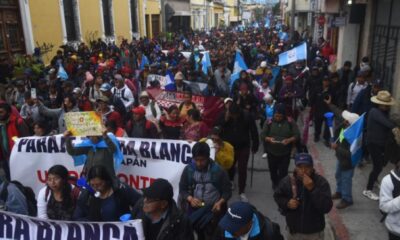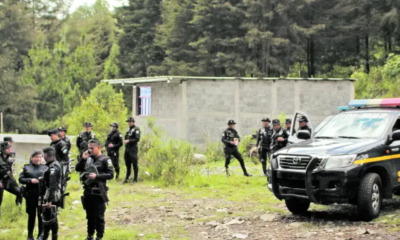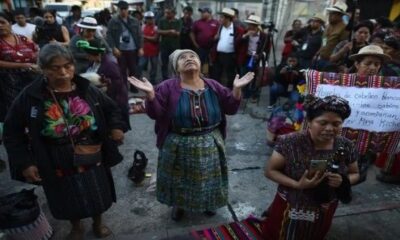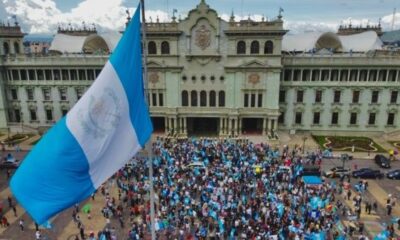Central America
Guatemalan court decides Wednesday whether to convict journalist José Rubén Zamora
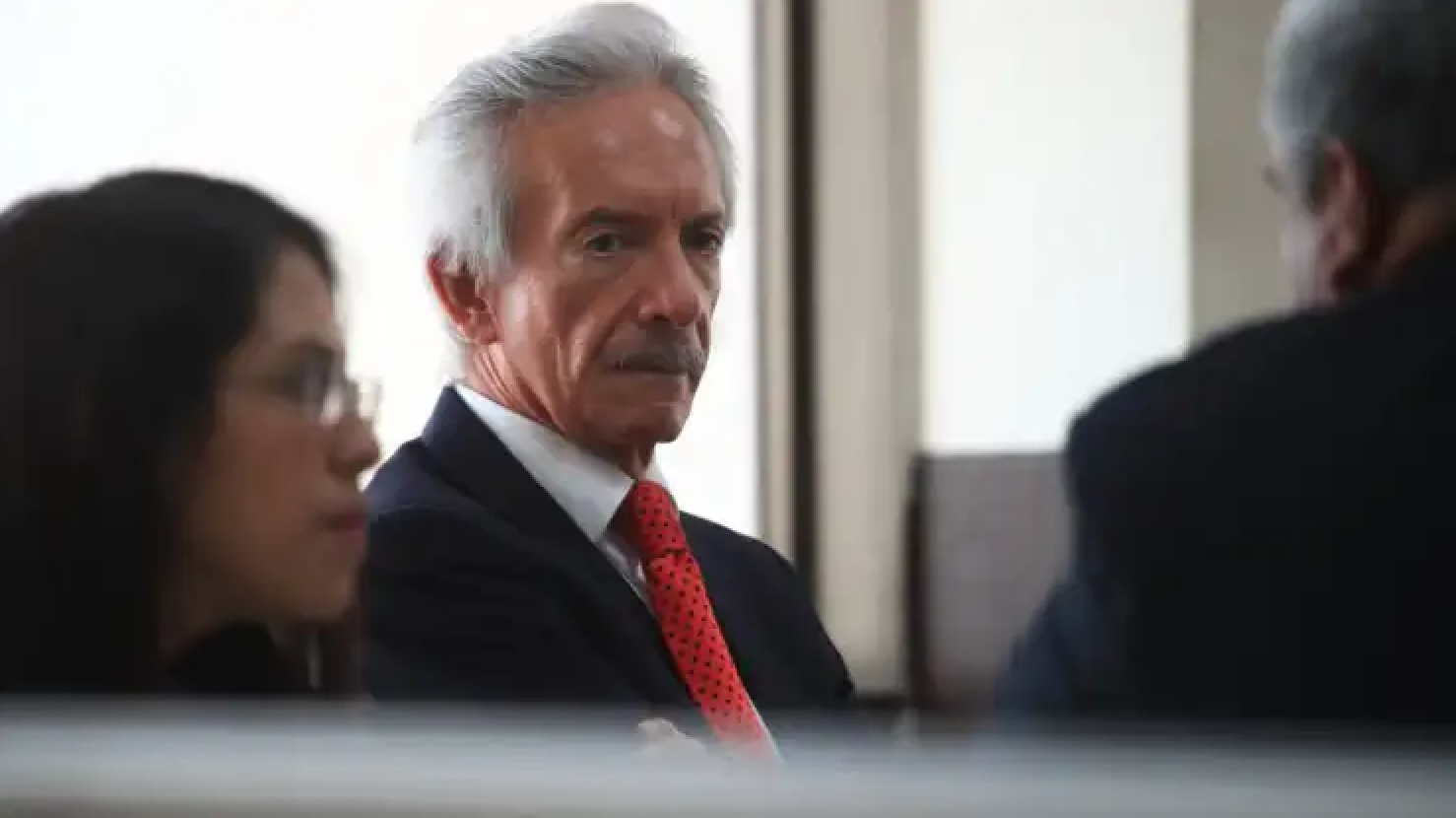
June 14 |
A Guatemalan court will decide this Wednesday whether to sentence journalist José Rubén Zamora, nationally and internationally recognized for his investigations on corruption and a strong critic of the government of President Alejandro Giammattei, accused of money laundering, extortion and influence peddling.
The sentence comes after several organizations denounced an escalation of authoritarianism in the country that includes the persecution of journalists and judicial officials and the exclusion of candidates who are not part of the traditional political forces.
The 66 year-old journalist has said he is innocent of the prosecution’s accusations and was tried without the court allowing evidence to be presented in his favor. Cinthia Monterroso is the prosecutor accusing him.
Zamora was director of El Periódico, a newspaper that closed its doors on May 15 under political and financial pressures, in which he exposed the accusations against Monterroso for abuse of power for allegedly using his position to investigate the unfaithful husband of a friend, among other allegations.
Monterroso asked the court that Zamora be sentenced to 40 years in prison for allegedly laundering bribe money and influence peddling and asked for aggravated sentences for “contempt for authority” for the journalist’s publications about the Attorney General, Consuelo Porras, and the head of the Special Prosecutor’s Office against Impunity, Rafael Curruchiche, both sanctioned by the US government for hindering the anti-corruption fight and undermining democracy in the country.
According to the prosecutor, Zamora asked his friend Ronald García Navarijo, a former banker accused of corruption, to deposit more than $30,000 in cash in a bank. Instead of doing so, he denounced Zamora.
Zamora’s defense claims that the money was the proceeds of a donation and that the journalist did not deposit it in an account of his own to avoid it becoming known who the donor was due to government pressure on El Periódico.
Meanwhile, Zamora’s family has said that what triggered the journalist’s imprisonment was the publication of a case known as “The Russian Plot”, according to which President Giammattei allegedly received bribes from Russian businessmen in exchange for benefits in mega-project concessions.
National and international press and human rights organizations have pointed out that the case against Zamora is a criminalization of journalism in Guatemala and have requested his release.
Although the prosecutor’s office has said that there is no persecution against the press, it asked Judge Jimi Bremer to authorize investigations against nine journalists from El Periódico for their publications about judges and prosecutors who had allegedly failed in the process against Zamora.
The prosecutor’s office has also charged Zamora in two other cases, one of them for falsification of documents for allegedly having incorrectly signed immigration tickets when leaving or entering the country.
Judge Bremer himself, at the request of the prosecutor’s office headed by Monterroso, is the one who has ordered the initiation of this investigation.
Zamora has received awards such as the Maria Moors Cabot Award from Columbia University, the International Press Freedom Award and the World Press Freedom Hero Award from the International Press Institute.
Central America
Washington Imposes Visa Ban on La Modelo Director Amid Crackdown in Nicaragua

The United States government announced Wednesday that it has imposed visa restrictions on Roberto Clemente Guevara Gómez, director of Nicaragua’s largest prison, La Modelo, for his involvement in actions that violate human rights.
In a statement, U.S. Secretary of State Marco Rubio said the measure is intended to promote accountability for abuses committed under what he described as the “Murillo-Ortega dictatorship” against political prisoners.
Rubio specified that Guevara Gómez was designated for participating in “a gross violation of the human rights of a political prisoner.” The sanction was issued under the 2024 Department of State, Foreign Operations, and Related Programs Appropriations Act, which bars the sanctioned individual — and potentially immediate family members — from entering the United States.
“United States demands the immediate and unconditional release of all political prisoners unjustly detained in Nicaragua,” the statement added.
Ongoing tensions between Washington and Managua
Washington rejected Nicaragua’s November 2021 elections, in which President Daniel Ortega and his wife, now co-president Rosario Murillo, were reelected while seven potential challengers were in prison.
Relations between the two countries remain tense amid expanding U.S. sanctions and increasing diplomatic pressure on the Nicaraguan government.
On January 10, marking Ortega’s 19 years in power, Nicaragua released “dozens of detainees,” including political prisoners. The move came one day after the U.S. Embassy in Managua stated that “more than 60 people” remain “unjustly detained or disappeared” in the Central American nation.
U.S. officials have continued to push for the “unconditional release” of political prisoners rather than selective or temporary releases.
Ortega, 80, governs alongside Murillo with consolidated authority, having strengthened executive power through constitutional reforms and security measures, while the opposition has been weakened by imprisonment, exile, and the revocation of citizenship and property rights.
Central America
Guatemala’s Attorney General Consuelo Porras Loses Bid for Constitutional Court Seat

Guatemala’s attorney general, Consuelo Porras, who has been sanctioned by the United States over corruption allegations, lost a key vote on Monday in which a public university selected two of the 10 magistrates for the country’s highest constitutional court. However, she could still seek a seat through another nominating body.
The election of five full magistrates and five alternates to the Corte de Constitucionalidad (CC) is taking place gradually over more than two months and is considered crucial in the ongoing struggle for control of Guatemala’s judiciary, which critics say has long been influenced by a political and economic elite accused of corruption.
According to results announced at a press conference, the governing council of the Universidad de San Carlos de Guatemala (USAC) rejected Porras, who had applied as either a full or alternate magistrate, and instead chose two candidates aligned with the university rector. The vote was held at a hotel in Antigua, about 35 kilometers from the capital.
Despite the setback, Porras — whose term as attorney general ends on May 16 — could still be nominated to the Constitutional Court by the Corte Suprema de Justicia, which appoints two magistrates. The remaining six are selected by the president, the bar association and Congress.
“It’s always a possibility,” the 72-year-old lawyer said days earlier when asked by reporters whether she would seek nomination through another institution if she lost the USAC vote.
Porras has been sanctioned by Washington and the European Union for allegedly attempting two years ago to block the inauguration of President Bernardo Arévalo and for pursuing legal actions against anti-corruption prosecutors, judges, journalists and social leaders since taking office in 2018.
The USAC vote was controversial because most members of the university’s governing council are serving beyond the expiration of their terms. Students, academics and social activists staged protests against Porras’ candidacy.
Central America
Teens visit ETESAL substation to learn about responsible energy use

Within the framework of World Energy Day, teenagers from the institutional care center Ciudad Niñez y Adolescencia (CNA), run by the Consejo Nacional de la Primera Infancia, Niñez y Adolescencia (Conapina), took part in an educational visit to a substation operated by Empresa Transmisora de El Salvador (ETESAL) in Santa Ana.
The aim of the activity was to give participants first-hand knowledge of how the country’s electricity transmission system works and to highlight the importance of responsible energy use.
During the tour, the group learned about the process that delivers electricity to homes, businesses, and industries. They were also introduced to specialized technical equipment and the safety measures required to ensure an efficient and reliable service.
Before the guided visit, the teenagers attended two informative talks and an environmental awareness session focused on the relevance of responsible energy consumption and its impact on the environment.
According to Nelson Menjívar, head of Conapina’s programs unit, the initiative serves a dual purpose. “It has two objectives: a recreational component and an educational one, so that adolescents can learn about the work carried out by ETESAL and how some of the resources they use at home are generated. This is in keeping with the guarantees established under the Crecer Juntos law; we ensure those rights for children,” he said.
Menjívar stressed that these activities help young people better understand how essential services function in their daily lives while promoting efficient consumption habits and a culture of environmental respect and care.
The event is part of the principle of shared responsibility set out in the Crecer Juntos law, promoted by the administration of Nayib Bukele, which states that families, society, private companies, and the State must work together to safeguard the comprehensive well-being of children and adolescents.
-

 International3 days ago
International3 days agoFamily of “El Mencho” Seeks Return of Body After Deadly Military Operation
-

 International3 days ago
International3 days agoLarry Summers Steps Down from Harvard Role Amid Epstein Controversy
-

 International3 days ago
International3 days agoIran’s President Optimistic Ahead of Geneva Nuclear Talks with U.S.
-

 International3 days ago
International3 days agoBill Gates Admits “Serious Mistake” Over Epstein Ties
-

 International3 days ago
International3 days agoStephen Hawking Photo Appears in Newly Released Epstein Documents
-

 International2 days ago
International2 days agoCocaine Production Surges 34% in 2023 as Market Expands into Africa and Asia
-

 International2 days ago
International2 days agoFederal Judge Blocks Trump Policy Allowing Deportations to Third Countries
-

 International2 days ago
International2 days agoClinton Accuses Republican Committee of Using Epstein Case to Shield Trump
-

 International1 day ago
International1 day agoTrump Floats “Friendly Takeover” of Cuba Amid Rising Tensions
-

 International1 day ago
International1 day agoArgentina’s Senate Reviews Milei-Backed Labor Overhaul
-

 International4 hours ago
International4 hours agoSecurity Council to Hold Emergency Meeting on Middle East Crisis
-

 Sin categoría4 hours ago
Sin categoría4 hours agoTrump: ‘We Think It’s True’ Amid Claims Iran’s Supreme Leader Was Killed



















































































